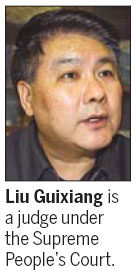Business lawsuits in sharp increase
Updated: 2012-02-29 09:07
By Zhang Yan (China Daily)
|
||||||||
More investment from overseas, slowing economy cited as reasons
|
|
The last 12 months saw a 10 percent rise in lawsuits, Liu Guixiang, presiding judge of the No 4 civil tribunal under the Supreme People's Court, said. The tribunal is in charge of non-mainland commercial and maritime trials.
Liu did not disclose the exact number of cases, but said they accounted for a "considerable portion" of the 31,953 civil and commercial lawsuits involving non-mainland firms last year.
Jiangsu province, in East China, provides a clear example.
The 114 cases in the province last year represented an increase of 20 percent over the previous year, according to court figures.
Apart from normal disputes regarding contracts, there were also more lawsuits involving bankruptcy and profit distribution, Liu said.
Courts are also dealing with cases involving international finance and derivatives, he said.
There has also been a shift in the type of businesses involved.
Legal disputes now concern the new industries, such as energy and the environment, as well as the more traditional ones, such as real estate and manufacturing.
Most of the cases involve companies from Asian countries and regions, such as Japan, the Republic of Korea, Singapore and Malaysia, as well as Hong Kong and Macao special administrative regions.
Disputes involving companies from Hong Kong and Macao accounted for 60 percent of the total, according to court figures.
Liu said the rise in disputes was partly due to an increasing number of overseas companies entering the mainland.
By the end of November, the mainland had about 453,600 of these companies, up from 426,000 in September 2008, according to figures from the State Administration for Industry and Commerce.
Yang Anjin, a lawyer and partner with Wis & Weals, a Beijing-based law firm that focuses on providing intellectual property services, said the main driving force behind the increase was globalization and the more opportunities that the mainland had to offer amid Europe's crisis.
"Apart from established US companies, we've noticed more and more small and medium-sized enterprises in Europe and Japan, that once ignored the mainland market, are now seeking opportunities on the mainland," he said.
Yang said localization is the most difficult aspect for newcomers.
"Compared with the early arrivals that have engaged more Chinese in decision-making and management, the late entrants are more conservative and unfamiliar with Chinese culture and laws."
Eduardo Leite, chairman of the executive committee of Baker & McKenzie, one of the world's largest law firms, also said it is "common" for international investors to have trouble obtaining local licenses and handling labor and intellectual property issues because of the complicated regulatory framework and unfamiliar culture.
Disputes usually pop up during difficult times and that is what is happening on the mainland, Liu said.
Businesses are facing rising labor costs and higher prices, for energy and raw materials.
The real estate market has also slowed down amid tightening measures, and the sluggish global economy has hit export demand. All these factors, and others, have contributed to more disputes.
Legislation concerning overseas-invested enterprises was drafted about two decades ago and may need to be updated, Liu said.
"For example, such laws fail to specify the detailed rights and obligations of the mainland and overseas parties," Liu said.
Moreover, due to different legal proceedings and concepts, some overseas investors questioned the efficiency of mainland courts, he said.
"We'll focus on unified judgment standards, improve the quality of judicial services and optimize the legal environment for overseas investment," Liu said.
"And most importantly, we'll protect the legitimate rights and interests of both mainland and overseas parties involved in disputes."
Wang Huazhong contributed to this story.

 Relief reaches isolated village
Relief reaches isolated village
 Rainfall poses new threats to quake-hit region
Rainfall poses new threats to quake-hit region
 Funerals begin for Boston bombing victims
Funerals begin for Boston bombing victims
 Quake takeaway from China's Air Force
Quake takeaway from China's Air Force
 Obama celebrates young inventors at science fair
Obama celebrates young inventors at science fair
 Earth Day marked around the world
Earth Day marked around the world
 Volunteer team helping students find sense of normalcy
Volunteer team helping students find sense of normalcy
 Ethnic groups quick to join rescue efforts
Ethnic groups quick to join rescue efforts
Most Viewed
Editor's Picks

|

|

|

|

|

|
Today's Top News
Health new priority for quake zone
Xi meets US top military officer
Japan's boats driven out of Diaoyu
China mulls online shopping legislation
Bird flu death toll rises to 22
Putin appoints new ambassador to China
Japanese ships blocked from Diaoyu Islands
Inspired by Guan, more Chinese pick up golf
US Weekly

|

|







